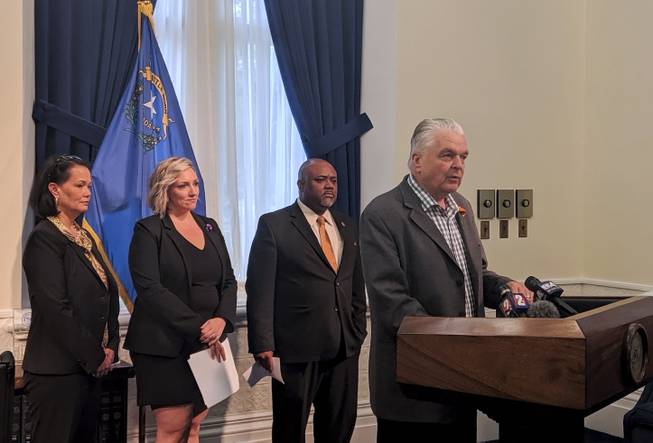
John Sadler
Gov. Steve Sisolak, right, addresses the state press corps during a news conference Tuesday, May 14, 2019, in Carson City. Sisolak, who was joined by, from left, Nevada Schools Supertintendent Jhone Ebert, Senate Majority Leader Nicole Cannizzaro, D-Las Vegas, and House Speaker Jason Frierson, D-Las Vegas, discussed their ideas for funding Sisolak’s promised public education priorities in the state’s two-year budget.
Wednesday, May 15, 2019 | 2 a.m.
CARSON CITY — Democratic leaders are opening two fronts in their quest to fund education priorities in Gov. Steve Sisolak’s state budget.
Two potential school funding sources were introduced Tuesday in the Nevada Legislature. One — Senate Bill 545 — would take the 10% excise tax collected on legal marijuana sales and put it in the state’s public education account. The other, an amendment to Assembly Bill 309, would allow counties to institute a sales tax of up to a quarter of a percent, directing all of the revenue gained from it toward schools.
In a news conference Tuesday afternoon, Sisolak talked about the quest to increase funding for the state’s public schools.
“Today we are here to tell parents, educators and all Nevadans that we heard you,” he said. “Last session, marijuana retail excise tax money did not go where it should have due to political gamesmanship.”
Sisolak ran for governor last year promising a pay raise for the state’s public school teachers, and he proposed a 2% merit pay raise and 3% cost of living raise for them in his first two-year state budget plan.
Finding the money to pay for those raises has been easier said than done.
“I’ve been working with legislative leaders and fiscal staff to fence off the funds for those raises to ensure that money makes it directly to educators’ pockets,” he said.
The marijuana tax is projected to raise $120 million over the next biennium. The Kenny Guinn Center for Policy Priorities, a private think tank, estimates the state will need an around $107 million to fund Sisolak’s education priorities.
Sisolak said that trying to balance budgets and meet the needs of public schools was one of the hardest challenges of his first year in the governor’s office, saying that after the education budgets had been funded, deficits popped up in other areas of the budget.
“We funded fully the (education) budgets we were given; that’s getting lost out there somewhere in the discussion,” he said. “But that was funded and now the numbers have changed.”
Marijuana tax revenue currently goes into the state’s rainy day fund, but it would be directed to the state distributive school account in the general fund under the Senate bill.
Senate Majority Leader Nicole Cannizzaro, D-Las Vegas, said the allocation of tax money to schools from the sale of recreation marijuana was a constant theme she heard from Nevadans.
“When I’m talking to my constituents I can tell you that one of the things they consistently bring up is making sure that all of the marijuana tax money goes to fund our local schools, and that’s exactly what the bill introduced today will do,” she said.
Sisolak was unable to say what the impact to per-pupil funding would be under the change.
In proposing that the sales tax be passed locally at the county level, the amendment gets around a requirement that any statewide tax increase win a supermajority in the Legislature.
Any sales tax increase under AB309 would still need the approval of a two-thirds majority of the relevant county commission, but it also could be approved by a majority of voters in the county by referendum.
Any money gained from a sales tax increase could be spent on a limited list of education-related projects, including incentives for attracting licensed teachers to high-vacancy areas of a county, adult education and programs to reduce truancy.
Under the amendment, school districts that raise salaries in discussion with one of its employee organizations — think unions — would be required to set aside the amount of money needed to fund that raise at the beginning of the fiscal year.
School districts would be barred from using the set-aside money for any other reason. Any money saved for the salary increase that isn’t used would roll forward for further pay increases.
The increase of money into education comes on the heels of both a proposed overhaul of the education funding formula by Democratic legislative leaders and a vote last week by the Clark County Education Association to authorize a strike next school year if lawmakers did not fund teacher raises.
Sisolak would not speak about the vote to strike at Tuesday’s press conference. It is illegal for public workers to strike in Nevada.
The timeframe for approving funding for schools — and the state budget at large — is closing. Lawmakers have a targeted adjournment of June 4 for their 2019 session.
